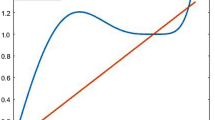Abstract
In this article, we derive accurate Horner methods in real and complex floating-point arithmetic. In particular, we show that these methods are as accurate as if computed in k-fold precision and then rounded into the working precision. When k is two, our methods are comparable or faster than the existing compensated Horner routines. When compared to multi-precision software, such as MPFR and MPC, our methods are significantly faster, up to k equal to eight, that is, up to 489 bits in the significand.














Similar content being viewed by others
References
ANSI/IEEE: IEEE Standard for Binary Floating Point Arithmetic, std 754-2008 edn. IEEE, New York, NY (2008)
ANSI/IEEE: IEEE Standard for Binary Floating Point Arithmetic, std 754-2019 edn. IEEE, New York, NY (2019)
Cameron, T.R., Graillat, S.: On a compensated Ehrlich–Aberth method for the accurate computation of all polynomial roots. Electron. Trans. Numer. Anal. 55, 401–423 (2022)
Dekker, T.J.: A floating-point technique for extending the available precision. Numer. Math. 18, 224–242 (1971)
Enge, A., Gastineau, M., Théveny, P., Zimmermann, P.: MPC: A library for multiprecision complex arithmetic with exact rounding. Inria, 1.2.1 edn. (2021). http://mpc.multiprecision.org
Fousse, L., Hanrot, G., Lefèvre, V., Pélissier, P., Zimmermann, P.: MPFR: a multiple-precision binary floating-point library with correct rounding. ACM Trans. Math. Softw. 33(2), 13-es (2007)
Gill, S.: A process for the step-by-step integration of differential equations in an automatic digital computing machine. Proc. Camb. Philos. Soc. 47, 96–108 (1951)
Goldberg, D.: What every computer scientist should know about floating-point arithmetic. ACM Comput. Surv. 23, 5–48 (1991)
Graillat, S., Louvet, N., Langlois, P.: Compensated Horner scheme. Technical report. Université de Perpignan Via Domitia (2005). https://www-pequan.lip6.fr/~jmc/polycopies/Compensation-horner.pdf
Graillat, S., Ménissier-Morain, V.: Accurate summation, dot product and polynomial evaluation in complex floating point arithmetic. Inf. Comput. 216, 57–71 (2012)
Higham, N.J.: Accuracy and Stability of Numerical Algorithms. SIAM, Philadelphia (2002)
Kahan, W.: Further remarks on reducing truncation errors. Commun. ACM 8, 40 (1965)
Knuth, D.E.: The Art of Computer Programming: Seminumerical Algorithms, vol. 2. Addison-Wesley, Reading (1998)
Langlois, P., Louvet, N.: Compensated Horner algorithm in \(K\) times the working precision. Research Report (2008). https://hal.inria.fr/inria-00267077
Møller, O.: Quasi double-precision in floating point addition. BIT 5, 37–50 (1965)
Nievergelt, Y.: Scalar fused multiply-add instructions produce floating-point matrix arithmetic provably accurate to the penultimate digit. ACM Trans. Math. Softw. 29(1), 27–48 (2003)
Ogita, T., Rump, S.M., Oishi, S.: Accurate sum and dot product. SIAM J. Sci. Comput. 26(6), 1955–1988 (2005)
Rump, S.M.: Inversion of extremely ill-conditioned. Jpn J. Ind. Appl. Math. 26, 249–277 (2009)
Author information
Authors and Affiliations
Corresponding author
Ethics declarations
Conflict of interest
The authors have no relevant financial or non-financial interests to disclose.
Additional information
Communicated by Elisabeth Larsson
Publisher's Note
Springer Nature remains neutral with regard to jurisdictional claims in published maps and institutional affiliations.
This work was partly supported by the NuSCAP (ANR-20-CE48-0014) project of the French National Agency for Research (ANR).
Rights and permissions
Springer Nature or its licensor (e.g. a society or other partner) holds exclusive rights to this article under a publishing agreement with the author(s) or other rightsholder(s); author self-archiving of the accepted manuscript version of this article is solely governed by the terms of such publishing agreement and applicable law.
About this article
Cite this article
Cameron, T.R., Graillat, S. Accurate Horner methods in real and complex floating-point arithmetic. Bit Numer Math 64, 17 (2024). https://doi.org/10.1007/s10543-024-01017-w
Received:
Accepted:
Published:
DOI: https://doi.org/10.1007/s10543-024-01017-w



